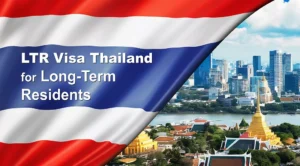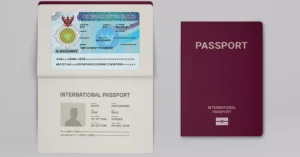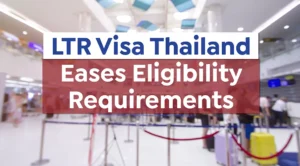Thailand now offers several long-term visa options that provide you and your family with multiple pathways to living in the country and building a life in the Land of Smiles! The most prominent choices include the Thailand Privilege Visa, the Destination Thailand Visa (DTV), and the Long-Term Resident Visa (LTR Visa).
In this article, we’ll cover what these visas are and their benefits for families to help you determine which will best suit your needs, lifestyle, and plan for bringing your family to Thailand.
What are the family benefits of the LTR Visa, DTV, and Thailand Privilege Visa?
Each of these long-term visas supports family members in different ways. Some offer rights to work in Thailand or access to exclusive perks, while others focus on simple, flexible entry.
Destination Thailand Visa (DTV)
The Destination Thailand Visa, also known as the DTV, was designed for remote workers and digital nomads who plan to frequently visit or live in the country for long periods, but those participating in Thai cultural activities can also apply for this visa.
It provides a 5-year residency in Thailand with multiple entries into the country, meaning that you can leave and return to Thailand as often as you please without needing to apply for a re-entry permit each time. However, each entry into the country has a stay limit of up to 180 days, with the option to extend.
If you qualify for the DTV, you can include an unlimited number of immediate family members on your visa by having them apply for the DTV under the dependent category. This includes your spouse and any unmarried children under 20.
Though it is the cheapest option among the three, it does not offer any additional benefits other than long-term residency in Thailand and has some specific eligibility criteria that not everyone can meet. This means that you and your family will be able to stay in Thailand but will not be able to work for a local company or study at a higher education institution in the country.
Long-Term Resident Visa (LTR Visa)
The Long-Term Resident Visa, also known as the LTR Visa, was designed for investors, retirees, digital nomads, and skilled professionals working in Thailand.
It provides a 10-year visa with no limit on re-entries or stay duration. As the main holder of the LTR Visa, you will now be able to add an unlimited number of immediate family members to your visa under the dependent category, thanks to a recent update to the rules. This includes your spouse, unmarried children under 20, and your or your spouse’s parents.
The LTR Visa comes with several benefits, all of which you and your family members will share, such as:
- Expedited immigration processing at international airports in Thailand
- Annual reporting to the immigration office, unlike the standard 90 days required of other Thai visas
- The right to obtain a work permit and work for a local company (if they qualify)
- A fixed income tax rate (Skilled Professional category only)
- Thai income tax exemption on foreign income (Remote Professional category only)
- And more
Depending on the category you choose to apply for, you will need to meet requirements on annual income, work experience, or the employer’s annual revenue. However, in 2025, the eligibility requirements for the LTR Visa have been reduced, meaning that it has become accessible to a larger population of applicants.
Thailand Elite Visa
The Thailand Elite Visa is available through a membership with the Thailand Privilege Program. This visa was designed for individuals and families seeking a hassle-free, long-term stay in Thailand with benefits that make living in Thailand more convenient, cost-effective, and fun. It is available through 5 membership tiers with stays lasting from 5 to 20 years, and it comes with a multiple-entry visa that allows you to travel in and out of Thailand without needing to apply for a re-entry permit each time.
However, this visa does not permit employment with a Thai company. That said, you and your family can still work remotely, as long as your clients are not Thai nationals or businesses based in Thailand.
You can include an unlimited number of immediate family members under your main membership package at a discounted membership fee rate, which makes it a practical option for larger households.
The full list of benefits offered by the Thailand Privilege Visa is too long to cover in this article, but below is a quick overview of the most notable perks you and your family can enjoy:
- Expedited immigration processing at international airports in Thailand
- Elite Personal Assistant (EPA) services
- Annual health check-ups
- Discounts at international schools, shopping malls, and dining experiences
- Assistance with filing the 90-day report to the immigration office
- Access to the Thailand Privilege Points System, which can be used to redeem perks and benefits such as free spa treatments, golf sessions, boat and car rentals, hotel stays, and many more.
Among the three visa options, the Thailand Privilege Visa is the easiest to apply for and obtain, as it involves minimal paperwork and a straightforward application process. The main requirements for the Thailand Privilege Visa are passing a basic background check and paying the membership fee.
To make the process even easier and to maximize your chances of approval, you can get in touch with a General Sales and Services Agent (GSSA). These are organizations partnered with the government to provide free assistance with your Thailand Privilege Visa application, as they help gather all the necessary documents, review them for accuracy, and submit the application on your behalf to the correct government agencies.
Which Long-Term Thai Visa Is Best for Families
The best visa to apply for will depend on your family’s long-term plans, as each visa was designed to cater to different lifestyles. Here are some common scenarios for when which visa will be more practical:
For Working in Thailand Long-Term
If you plan to work remotely or for a company in Thailand long-term, the LTR Visa will allow you to do so with added benefits:
- For employees in Thai companies, these benefits include cheaper and easier-to-obtain work permits and a fixed 17% personal income tax rate, compared to Thailand’s progressive tax rate which could go as high as 35%.
- For remote workers, the most noticeable benefit is the complete exemption from Thai taxes on foreign income, meaning that any income brought into Thailand will be exempted from Thai taxes.
To make the transition of adjusting to Thailand smoother, your family may work or study in the country, provided they meet specific requirements. While more difficult to qualify for, the benefits included in the LTR visa are unmatched for building a new life with your family in Thailand.
For Frequent Visits to Thailand with No Long-Term Commitment
If you and your family only plan to spend part of the year in Thailand or stay for several months at a time, the DTV may be a better fit, as it will grant you the flexibility to come and go as you please. It’s a low-commitment option with an application process that does not require you to prove investments or long-term employment within Thailand.
However, you and your family will not receive immigration benefits (such as expedited processing and the right to work in Thailand) and will be required to report to the immigration office every 90 days of continuous stay, unlike LTR Visa holders who report annually and Thailand Privilege Visa holders who receive assistance with their reporting.
For Easy Long-Term Stays With the Best Perks
If you plan to settle in Thailand or visit for extended periods with your family, the Thailand Privilege Visa offers the most convenient and rewarding way to secure long-term stays in the country. It is by far the easiest to qualify for, with few requirements beyond a simple background check done for you by the government.
The Thailand Privilege Visa gives you and your family access to a wide range of exclusive benefits that support a comfortable lifestyle in Thailand. As mentioned before, this includes immigration assistance, healthcare services, school discounts, and a variety of redeemable perks that can make every day in Thailand an adventure.
If you plan to enroll your children in a school, you can have them apply for a Thailand ED Visa, which will allow them to legally study in Thailand. Though they cannot hold two visas at once, they will still be able to enjoy the perks and benefits offered by the Thailand Privilege Visa while holding the Thailand ED Visa.
While employment with a Thai company is not permitted, remote work is allowed as long as your clients are based outside of Thailand and are not Thai businesses.
Professional Assistance with Bringing Your Family to Thailand
To streamline the process of entering Thailand with your family, get in touch with Siam Legal International. As a full-service law firm and visa consultancy with over 20 years of experience helping clients from around the world secure their Thai visas, we have the knowledge and expertise to find the ideal solution for you and your family.
Our team of bilingual Thai visa consultants will walk you through the application process for the DTV, LTR, or any other Thai visa of your choice and provide expert advice along the way. Our services streamline your experience, maximize the chances of approval, and minimize delays.
Also, as a government-partnered GSSA, we have in-depth knowledge of the process for applying for the Thailand Privilege Visa and will assist you with your application free of charge, whether you’re abroad or in Thailand.
For a smooth entry into Thailand with your family that’s free from stress and immigration hurdles, do not hesitate to contact Siam Legal to book a consultation now!









































